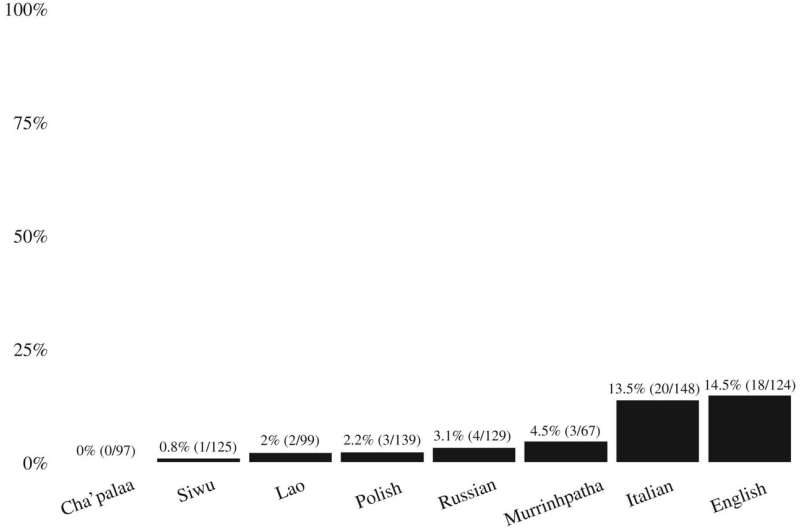Frequency of expressions of gratitude after successful requests (928 cases). Credit: Royal Society Open Science (2018). DOI: 10.1098/rsos.180391
An international team of researchers has found that people around the world rarely say "thank you" to those closest to them. In their paper published in the journal Royal Society Open Science, the group describes their study of expressing gratitude and what they found.
Saying "thank you" when someone does something for you is a way of expressing gratitude. It is also generally considered the polite thing to do—but mostly only in public conversations, the researchers with this new effort found.
To learn more about expressions of gratitude as part of social interactions, the researchers installed microphones in the homes and community gathering places of volunteers. In all, the team recorded 1,057 conversations from which they counted instances when someone offered thanks to the other. They did this for people living on five continents using eight languages.
In analyzing their tallies, the researchers found that people say "thank you" far less than might be assumed—at least when talking with family or close friends. They also found that there were differences among different groups. Those speaking English, for example, tended to offer thanks approximately 14.5 percent of the time. Those speaking Italian were close behind at 13.5 percent. But in other countries, it was much lower, such as just 2 percent for Polish speakers. Overall, the average was just 5.5 percent.
The researchers suggest what they found is not an example of people feeling freer to be rude to family, but an example of a basic standard of reciprocity. This suggests, they note, that the default answer is "yes" when asked for something in a family situation. The expectation is that the person receiving the request will do it. And it happens a lot more than most might think. The researchers found that during normal conversation, people make requests of others approximately every 1.5 minutes, on average. They also noted that when thanks were not expressed, the other person was not upset—and, indeed, rarely even noticed it. It was only when the other person said "no" that the person asking responded in a meaningful way. And it was the same for the person being asked—they only felt the need to explain themselves when turning down a request.
More information: Simeon Floyd et al. Universals and cultural diversity in the expression of gratitude, Royal Society Open Science (2018). DOI: 10.1098/rsos.180391
Abstract
Gratitude is argued to have evolved to motivate and maintain social reciprocity among people, and to be linked to a wide range of positive effects—social, psychological and even physical. But is socially reciprocal behaviour dependent on the expression of gratitude, for example by saying 'thank you' as in English? Current research has not included cross-cultural elements, and has tended to conflate gratitude as an emotion with gratitude as a linguistic practice, as might appear to be the case in English. Here, we ask to what extent people express gratitude in different societies by focusing on episodes of everyday life where someone seeks and obtains a good, service or support from another, comparing these episodes across eight languages from five continents. We find that expressions of gratitude in these episodes are remarkably rare, suggesting that social reciprocity in everyday life relies on tacit understandings of rights and duties surrounding mutual assistance and collaboration. At the same time, we also find minor cross-cultural variation, with slightly higher rates in Western European languages English and Italian, showing that universal tendencies of social reciprocity should not be equated with more culturally variable practices of expressing gratitude. Our study complements previous experimental and culture-specific research on gratitude with a systematic comparison of audiovisual corpora of naturally occurring social interaction from different cultures from around the world.
Journal information: Royal Society Open Science
© 2018 Phys.org























